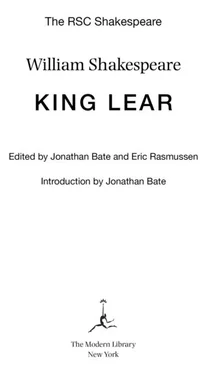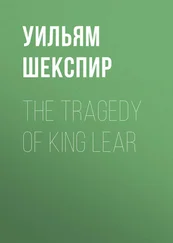уильям шекспир - King Lear
Здесь есть возможность читать онлайн «уильям шекспир - King Lear» весь текст электронной книги совершенно бесплатно (целиком полную версию без сокращений). В некоторых случаях можно слушать аудио, скачать через торрент в формате fb2 и присутствует краткое содержание. Год выпуска: 2011, ISBN: 2011, Издательство: Random House Publishing Group, Жанр: Старинная литература, на английском языке. Описание произведения, (предисловие) а так же отзывы посетителей доступны на портале библиотеки ЛибКат.
- Название:King Lear
- Автор:
- Издательство:Random House Publishing Group
- Жанр:
- Год:2011
- ISBN:978-1-58836-828-7
- Рейтинг книги:3 / 5. Голосов: 1
-
Избранное:Добавить в избранное
- Отзывы:
-
Ваша оценка:
- 60
- 1
- 2
- 3
- 4
- 5
King Lear: краткое содержание, описание и аннотация
Предлагаем к чтению аннотацию, описание, краткое содержание или предисловие (зависит от того, что написал сам автор книги «King Lear»). Если вы не нашли необходимую информацию о книге — напишите в комментариях, мы постараемся отыскать её.
King Lear — читать онлайн бесплатно полную книгу (весь текст) целиком
Ниже представлен текст книги, разбитый по страницам. Система сохранения места последней прочитанной страницы, позволяет с удобством читать онлайн бесплатно книгу «King Lear», без необходимости каждый раз заново искать на чём Вы остановились. Поставьте закладку, и сможете в любой момент перейти на страницу, на которой закончили чтение.
Интервал:
Закладка:
Warner:Cordelia does not want to play this extravagant and obscene party game. She is young, she is shy, and she is about to be married, perhaps even the public nature of this serious business of land division is difficult for her. Anyhow, extravagant party game or not, it is the wrong moment for her to speak of her love to her father, and she certainly does not want to talk about such matters in public. When her sisters speak she is appalled by their preparedness to speak on cue, and especially so since she knows they are being dishonest. Cordelia wants to hold to her own truth. Horrified by what is happening around her, she wants to stop the game, and that is just what she does. It goes horribly wrong because she won’t play, and she advertently or inadvertently humiliates her father in public. She is young and she believes with stern clarity in the virtues of honesty, truth, and love. She is earnest—some might say overearnest in this context, and she causes an atomic explosion.

7. The opening scene in Deborah Warner’s 1990 production: a party game goes horribly wrong, with Brian Cox as Lear in wheelchair and paper crown.
Lear is both a king and a father. That often seems to be a choice that directors and actors have to make—are you going to give the primary emphasis to Lear’s journey as a king giving up his crown, or is the primary emphasis going to be on the family relationships? Or do you actually think that the essence of the play is that the two are inextricably intertwined?
Noble:Without question they are entwined. I didn’t find that a choice. It isn’t a choice that I recognize.
Warner:The father relationship is the most interesting, he is a father who happens to be a king; but since all fathers are kings then, yes, all is intertwined. There is a lot we don’t know about him, about his reign—but we know that he owns the land of his country and chooses to divide that up in such a way that will benefit his retirement most comfortably. He is a king/father heading toward retirement, a dangerous time in all families and in all monarchies.
Nunn:You won’t be surprised to hear that your “third way” alternative is the one this production goes for. Shakespeare is frighteningly brilliant at doing “family breakup.” He does it superbly—in Hamlet , for example. I would say he does it equally shockingly in The Merchant of Venice , and in Macbeth we watch a marriage coming apart at the seams. There are small insights in King Lear into how the king’s family has been pushed apart by events and attitudes. Lear is eighty years old. He has three daughters, and there is no Mrs. Lear. The older daughters are married to powerful men and live in their own palaces. The youngest daughter is only just of marriageable age. Hidden behind the play, is there a story that he was a king who had two wives?—the first wife producing two daughters, Goneril and Regan, and then after her death (as we can frequently see in modern complex family histories) there is the child of a second marriage, the late child (as far as that father is concerned) who then dominates the father’s affections. There’s sufficient evidence in the play to suggest that jealousies and rifts within the family derive from such a backstory.
But I don’t think exploration of a family feud is where Shakespeare wants matters to stop. It’s not where his focus is. Routinely at the start of rehearsals, I say we have to first uncover the theme of a Shakespeare play. If you’re a director, you must X-ray the play to find out what its bone structure is and where its vital organs are. A production shouldn’t work from the outside, it must proceed from a sense of what the internal structure is, and thereby discover how everything contained in the play is meaningful because it is contiguous to that thematic structure.
In the case of Lear , it being one of the greatest plays of Shakespeare’s maturity, the investigation is not going to be easy and the wellspring is not going to lie very close to the surface. Those who have written about Lear as Shakespeare’s study of Nature are, to my thinking, somewhere near the mark, in the sense that Shakespeare is certainly inquiring into human nature in Lear , and he often uses the term “nature” to encompass human behavior and its contradictions. But let’s take that definition of a theme just a little bit further. I would say Shakespeare is wanting to look at the human being, both sublime and ridiculous; I think he is asking, “What is the human condition?” Why do humans say to themselves they are close to being angels, aspiring toward those qualities that are spiritual and godlike? And yet, why are they, in much of their action, so close to behaving like animals? Why, as it were anthropologically, do they have animal instincts that the species appears not to be able to get rid of?
I think it’s no surprise that in this play Shakespeare doesn’t define exactly who the god or gods are. There’s a shadowy Apollo or Jupiter, and the sun is sacred, but the largely anonymous gods are referred to, as a sort of necessity for human beings to believe in, so that somehow humans can feel their actions are predestined, or governed by forces above and beyond themselves. Everything is under the control or the will of the gods.
But then, close to the center of the play, there’s a young man who says: “Thou, nature, art my goddess: to thy law / My services are bound”—a young man who seems to be saying, “I don’t believe in the gods above, it’s human nature that I am influenced by.” At the end of that first soliloquy, Edmund says, I sense almost in mockery: “Now gods, stand up for bastards.” Well, he implies, you “gods” have supposedly stood up for everybody else, it’s high time you let bastards have a go. It’s an extremely dangerous bit of comedic dramaturgy, but atheistical Edmund, creating mayhem in his world, is placed in sharp contrast to the majority who genuinely beg the gods to intervene, at times almost obsessively. And I think Shakespeare makes it clear that “the gods” don’t. Repeatedly they are deaf or callous or nonexistent. They do nothing, even when their intervention would be an affirmation of “the good” in opposition to what is evil; they don’t utter, they don’t move a muscle. Are the heavens empty?
An actor who has played Lear has said that the real difficulty in playing the part is deciding how much to let rip how soon—if you give too much to the anger in the first half you’re too exhausted for the madness in the second half, but if you have too much control to begin with, the transition into madness can seem too sudden and extreme to be convincing. Do you recognize that difficulty? And as a director, what can you do to help your Lear through it?
Noble:I think that’s very true. Most Lears I’ve talked to find the second half much easier than the first half, because the first half requires such a level of energy and a very skillful control of your resources. The truth is, it’s almost unplayable—the pain is so great, the vocal demands so much. I’ve seen people cop out of it and say I’m going to do it quite quietly, but that’s complete crap. They are selling the part and the audience short. It gets actors down a lot actually, because it magnifies your failures. The same is true for directors. It’s like Everest, it’s an unforgiving mountain, and people die on the way up, or they get badly hurt. It is like singing Wagner, and not everybody can sing Wagner.
Читать дальшеИнтервал:
Закладка:
Похожие книги на «King Lear»
Представляем Вашему вниманию похожие книги на «King Lear» списком для выбора. Мы отобрали схожую по названию и смыслу литературу в надежде предоставить читателям больше вариантов отыскать новые, интересные, ещё непрочитанные произведения.
Обсуждение, отзывы о книге «King Lear» и просто собственные мнения читателей. Оставьте ваши комментарии, напишите, что Вы думаете о произведении, его смысле или главных героях. Укажите что конкретно понравилось, а что нет, и почему Вы так считаете.












